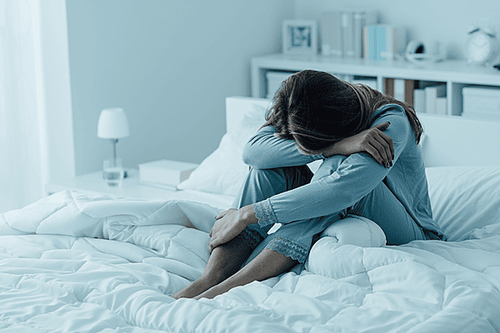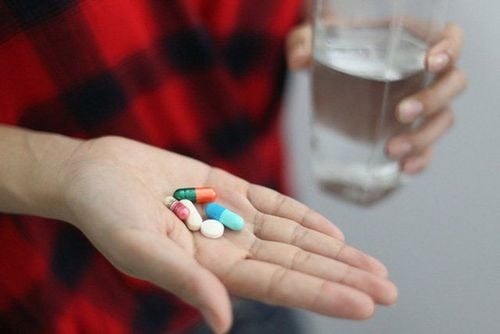This is an automatically translated article.
Feeling sad is a normal response to difficult times in life. Usually, sadness goes away after a while. But depression is different, it's a medical condition that can cause severe symptoms that can affect how you feel, think and control everyday activities like sleeping, eat or work. Depression is more common in women than men, possibly due to certain biological, hormonal, and social factors that are unique to women.1. Depression is a real health problem
Depression is a common mood disorder that can have serious consequences. Symptoms of depression can interfere with a person's ability to work, sleep, study, eat, and enjoy life. Although the causes of depression are still being studied, recent results suggest that depression is caused by a combination of genetic, biological, environmental, and psychological factors. Most people with depression need treatment to feel better.
You can't get rid of the symptoms of depression on your own
You can talk to close friends or family members about depression to get rid of it, or just think positively, you can feel better if you try harder. Depression is not a sign of a weak person or some kind of personality defect. The truth is that most people who have experienced depression need treatment to get better.
If you are a friend or member of a family with a depressed woman, you can help them emotionally, be understanding, patient and encouraging. But you shouldn't ignore her feelings. Encourage her to talk to her doctor and remind her that with time and treatment, she can feel better.
Most people with depression need treatment to feel better
If you think you may be depressed, start by making an appointment with your doctor or healthcare provider. This could be your primary doctor or a medical provider who specializes in diagnosing and treating mental health conditions (for example, a psychologist or psychiatrist).
Certain medications, and certain health conditions, such as viruses or thyroid disorders can also cause symptoms similar to depression. A doctor can rule out these possibilities by doing a physical exam, interview, and testing. Your doctor or healthcare provider will examine you and talk to you about treatment options and next steps.

Trầm cảm ảnh hưởng đến sức khỏe cũng như cuộc sống sinh hoạt của người bệnh
2. Depression can literally lead to hurt
Sadness is only a small part of depression. In fact, some people with depression don't feel sad at all. A person with depression may also experience a variety of physical symptoms, such as pain, headaches, cramps, or digestive problems. A person with depression may also have trouble sleeping, wake up in the morning, and feel tired.
If you have been experiencing any of the following signs and symptoms for at least two weeks, you may be depressed:
Feeling sad, anxious, or empty Feelings of hopelessness or pessimism Irritability Feelings of guilt, worthlessness or helplessness Decreased energy or fatigue Difficulty falling asleep, waking up early, or oversleeping Loss of interest or pleasure in hobbies and activities Move or speak more slowly Feeling restless or difficulty sitting still Difficulty concentrating, remembering, or making decisions Appetite and/or weight changes Thoughts about death or suicide, or suicide attempts Pain or aches, headaches, cramps, or other digestive problems without an obvious physical cause and/or not easy even with treatment Talk to your doctor about these symptoms. Be honest, clear, and concise, your doctor needs to know how you feel. Your doctor may ask when your symptoms started, what time of day they occur, how long they last, how often they occur, if they seem to be getting worse or progressing for the better, and whether do they prevent you from leaving the house or performing the usual activities in your life. It may help to take time to make notes about your symptoms before seeing your Doctor.

Khó ngủ là một trong những triệu chứng của bệnh trầm cảm
3. Some types of depression are only found in women
Pregnancy, the postpartum period, perimenopause, and the days of your menstrual cycle are all associated with major physical and hormonal changes. Types of depression that occur at different stages in a woman's life include:Premenstrual dysphoric disorder (PMDD)
Most people are familiar with the term premenstrual dysphoric disorder menstrual day. Moodiness and irritability in the weeks leading up to menstruation are common and symptoms are usually mild. But there is a less common, more serious form of the disorder called premenstrual dysphoric disorder (PMDD). PMDD is a serious condition with uncontrolled symptoms such as irritability, anger, depressed mood, sadness, suicidal thoughts, changes in appetite, bloating, breast tenderness and joint pain or muscle.
Perinatal depression
Pregnancy is not easy. Pregnant women often deal with morning sickness, weight gain, and mood swings. Taking care of a newborn is also a challenge. Many moms first come across the term "baby blue" used to describe feelings of anxiety, unhappiness, mood swings, and fatigue in the postpartum period. These sensations are usually mild, last a week or two, and then go away as the mother adjusts to caring for the newborn.
Perinatal depression is depression during or after pregnancy (postpartum). Perinatal depression is much more severe than “baby blues”. The feelings of sadness, anxiety, and exhaustion that accompany perinatal depression can make it difficult to complete daily care activities for first-time mothers and babies.
If you think you have perinatal depression you should talk to your doctor or a trained mental health professional. If you see any signs of depression in a loved one or someone you know during pregnancy or after the baby is born, encourage her to see a health care provider or go to the hospital. specialist clinics.
Premenopausal depression
Perimenopause (the transition to menopause) is a common, sometimes challenging, stage in a woman's life. If you're going through perimenopause, you may experience irregular periods, trouble sleeping, mood swings, and hot flashes. But it's a given that it's normal for you to have those feelings. If you're struggling with irritability, anxiety, sadness, or loss of your interests at the menopausal transition, you may be suffering from menopausal depression.
4. Depression affects every woman differently
Not every woman with depression experiences all of the symptoms of depression. Some women experience only a few symptoms. Others may experience more symptoms. The severity and frequency of symptoms, and how long they last, will vary depending on the individual and her particular illness. Symptoms can also vary depending on the stage of the disease.

Bệnh trầm cảm cần được điều trị sớm
5. Depression Can Be Treated
Even the most severe cases of depression can be treated. Depression is usually treated with medication, psychotherapy (in which the person with depression talks to a trained professional, sometimes called talk therapy), or a combination of the two. . If these treatments fail to relieve symptoms, anticonvulsant therapy (ECT) and other brain stimulation therapies may be options for testing.
Remember: Depression affects each individual differently. There is no one treatment that fits all cases. It may take several trials or even treatment failure to find the most effective treatment.
Now scientists continue to study depression to improve the way it is diagnosed and treated. For example, scientists are now working to understand how changes in reproductive hormones cause mood disorders, why some women are at higher risk than others, and how they can switch those changes. their research results into new treatments or improvements to existing ones.
Depression is completely treatable. If you need help you can find local mental health treatment programs or ask your Doctor or other health care provider. Talking with a Doctor with confidence will bring about good, quality, safe and satisfying treatment results.
Psychology Clinic - Vinmec International General Hospital officially came into operation in April 2019, has the function of examining, consulting and outpatient treatment of psychological problems and psychological health. With modern equipment, Vinmec Mental Health Clinic is currently cooperating with experienced professors and experts.
Along with the implementation of psychological tests, intensive psychotherapy for diagnosis and treatment, in order to bring the best medical examination and treatment effect.
Customers can directly go to Vinmec Health system nationwide to visit or contact the hotline here for support.
Articles source reference: nimh.nih.gov













